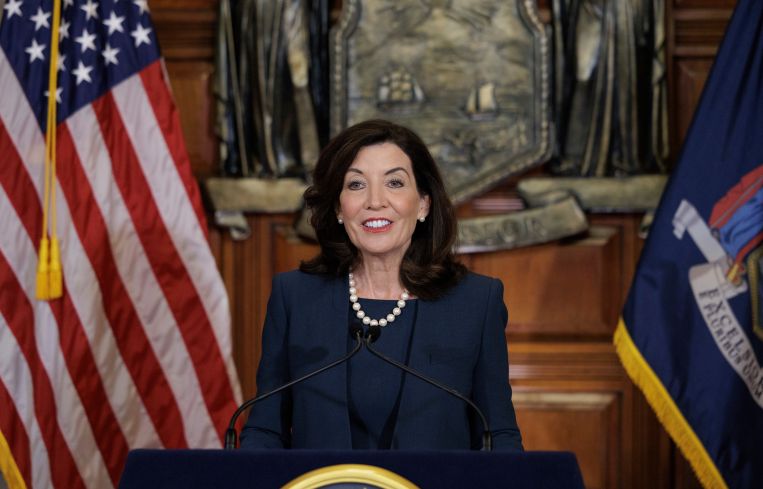NY Lawmakers Surprised by Hochul’s Reported 421a Revival Talks With REBNY and Labor
By Aaron Short July 13, 2023 1:35 pm
reprints
Gov. Kathy Hochul’s attempts to circumvent the state legislature by using an executive order to revive a generous tax incentive for developers that expired last summer has not been well received among lawmakers.
Multiple New York state lawmakers said they were not clued in to reported conversations the governor had with real estate and labor leaders over how to create a substitute to the 421a program that would allow owners to recoup a similar amount of cost savings on their projects in place of the tax break.
“I don’t think one can deal with a housing crisis truly behind the scenes without the legislature as a partner. That’s the wrong way to get something done,” Linda Rosenthal, an Assembly member from Manhattan who chairs the Assembly’s Housing Committee, told Commercial Observer. “There needs to be all perspectives on the table, and discussion among a broad coalition.”
A spokesperson for Hochul did not respond to a request for comment.
Lawmakers left Albany last month without reaching a housing deal after the governor and legislative leaders failed to reach consensus on an array of new tenant protections, provisions to increase housing density, mandates for suburban housing development, or measures to allow office space conversions. A proposal to apply the abatement to mixed-income projects that had begun construction but could not be finished by the law’s June 2026 deadline also failed to gain momentum.
Assemblymember Maritza Davila of Brooklyn was disappointed that the state legislature didn’t pass any housing measures but said the key issue holding back the tax incentive was that lawmakers wanted greater levels of affordability for rental units — about 40 to 80 percent of area median income levels — than developers were willing to offer.
“We have a huge homeless population. Where are we supposed to put all of these homeless people? How are we supposed to accommodate them?” Davila said. “We have to build. The housing stock is not being built, but we have to be able to buckle down and fight. And if that means saying no, that means saying no.”
Once the legislative session was over, Hochul floated the idea of issuing an executive order that would establish a payment-in-lieu-of-taxes program for developers run by the city’s economic development corporation, which would transfer their leases to the city and receive a property tax abatement in return.
Hochul conferred with the Real Estate Board of New York and the Building and Construction Trades Council on the specifics of the potential 421a replacement, New York Focus and The Real Deal reported.
But REBNY and Building Trades — groups that in 2019 agreed to have a unified front in pushing policy decisions to lawmakers — couldn’t agree on the plan. REBNY supported the measure, but Building Trades insisted the order include wage guarantees that would apply to all projects that receive a tax break.
Instead, REBNY balked and the governor pulled the measure without ever making a public announcement.
“In the absence of such policies, the city’s housing supply crisis will continue to worsen,” REBNY President James Whelan said in a statement.
Gary LaBarbera, the leader of Building Trades, did not respond to a request for comment.
Labor leaders and their allies warned that an affordable housing tax abatement without a prevailing wage requirement would never be acceptable in any negotiation.
“The whole point of tackling the housing crisis is to make New York an affordable place to put down roots and support your family,” Jessica Ramos, a state senator from Queens and chair of the Senate Labor Committee, said in a statement. “Housing justice requires safe, family-sustaining jobs as part of a greater strategy. With more day laborers in our job market than ever, this move would have resulted in a proliferation of dangerous job sites and a lowering of construction standards that make the sector safer for all workers.”
Hochul could try again to resuscitate the tax incentive, but when it comes to taxes and housing policy, the governor’s powers have their limits.
She could declare a state of emergency and attempt to extend the deadline by which properties would qualify for the incentive’s benefits. Gov. Andrew Cuomo made a similar maneuver in 2018 to turn on speed cameras in school zones for 30 days when the Republican-led Senate let the program expire.
But legislators doubted that Hochul had the unilateral authority to change the 421a deadline, which is written into state law.
“No one could contest that there isn’t a housing emergency in the city or state. But that said, I’m not sure how statutorily she might be able to do that,” Manhattan state Sen. Brad Hoylman-Sigal said.
Lawmakers instead suggested convening a special session in the fall to tackle housing, or hold a summit in which developers, labor unions, tenant groups and public officials hash out solutions to the state’s shrinking housing supply.
“She knows that we should be full partners for tackling the housing crisis,” Rosenthal said. “She obviously knows about it from her travels and her point of view, but we also talk to people and have our own opinions. This is something we need to tackle together.”
But real estate insiders believe elected officials could be waiting a long time for either side involved to offer any concessions.
“You have powerful economic interests versus mass mobilized tenants,” said Ken Fisher, a land use attorney with Cozen O'Connor. “We found creative solutions in the past but we’ve had 20 years of prosperity, and the upshot of that is nobody feels the pressure to compromise.”



